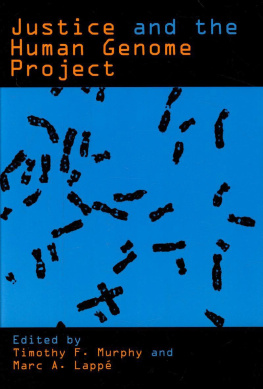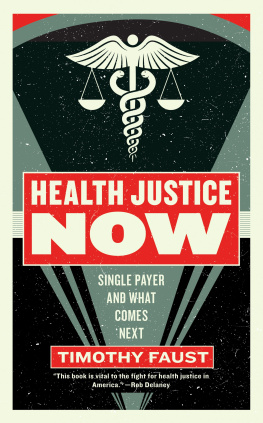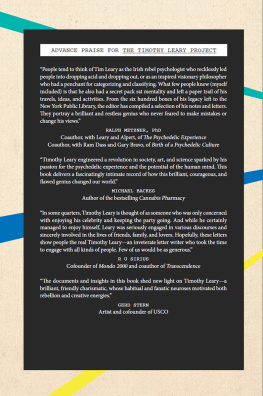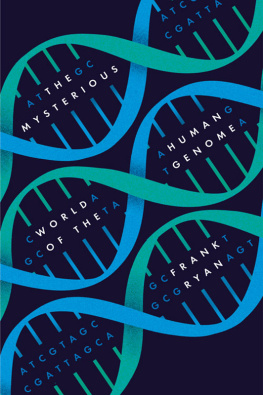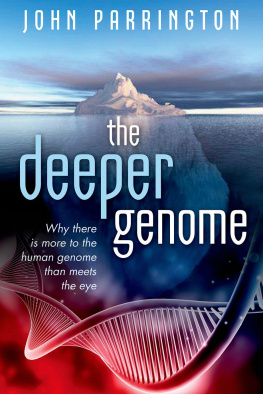Timothy F. Murphy - Justice and the Human Genome Project
Here you can read online Timothy F. Murphy - Justice and the Human Genome Project full text of the book (entire story) in english for free. Download pdf and epub, get meaning, cover and reviews about this ebook. year: 1994, publisher: University of California Press, genre: Politics. Description of the work, (preface) as well as reviews are available. Best literature library LitArk.com created for fans of good reading and offers a wide selection of genres:
Romance novel
Science fiction
Adventure
Detective
Science
History
Home and family
Prose
Art
Politics
Computer
Non-fiction
Religion
Business
Children
Humor
Choose a favorite category and find really read worthwhile books. Enjoy immersion in the world of imagination, feel the emotions of the characters or learn something new for yourself, make an fascinating discovery.
- Book:Justice and the Human Genome Project
- Author:
- Publisher:University of California Press
- Genre:
- Year:1994
- Rating:5 / 5
- Favourites:Add to favourites
- Your mark:
- 100
- 1
- 2
- 3
- 4
- 5
Justice and the Human Genome Project: summary, description and annotation
We offer to read an annotation, description, summary or preface (depends on what the author of the book "Justice and the Human Genome Project" wrote himself). If you haven't found the necessary information about the book — write in the comments, we will try to find it.
Justice and the Human Genome Project — read online for free the complete book (whole text) full work
Below is the text of the book, divided by pages. System saving the place of the last page read, allows you to conveniently read the book "Justice and the Human Genome Project" online for free, without having to search again every time where you left off. Put a bookmark, and you can go to the page where you finished reading at any time.
Font size:
Interval:
Bookmark:
University of California Press (1994)
ISBN-10: 0520083636
ISBN-13: 978-0520083639
Theessays gathered in this volume were among those presented at aconference titled "Justice and the Human Genome" held in Chicago inearly November 1991. The goal of that conference, sponsored by the U.S.Department of Energy and the University of Illinois at Chicago, was toconsider questions of justice as they are and will be raised by thehuman genome project, that ambitious multinational effort to map andsequence the entire human genome. To achieve its goal of identifyingand elucidating the challenges of justice inherent in genomic researchand its social applications, the conference drew together in one forummembers from academia, medicine, and industry in order to sketch outcentral questions that will follow the emergence of genomic profilingcapabilities.
The essays in this volume addresstheoretical and practical concerns relative to the meaning of genomicresearch. Whether the authors are concerned with the history ofeugenics, the meaning of individual differences, or access to healthcare, they are all united in their concern about the impact of genomicresearch on individual persons and their place in specific ethnic andcultural groups. If there is a common goal underlying the analyseshere, it is the protection of individual persons and cultural groupsfrom unjust social prejudices and arrangements that would burdenindividual choice or degrade the worth of certain groups defined ininvidious ways. It is perhaps a measure of the age that we express asmuch anxiety as hope with regards to the human genome project. It isthe goal of this volume to resist inappropriate anxiety by offeringmoral analysis that resists facile and corrupting uses of genomicresearch but that nevertheless emphasizes the very real significanceand importance of genomic research.
While many ofthe concerns raised about the genome project have a fantastic qualityto them, Timothy F. Murphy, in "The Genome Project and the Meaning ofDifference," nevertheless cautions
againstcertain subtle effects of a coordinated scientific project whose goalis a characterization of the human genome. By reason of the conformingforces involved in carrying out a centrally coordinated program ofresearch and the inevitable influence of a "standard" human genome inbiomedical thinking, genomic research may have the effect of workingagainst incentives to scientific progress and tolerance of humandiversity. In a cautionary vein, he notes this paradox of science: evenas it advances the realm of human knowledge and offers ways toalleviate human suffering, it may have the effect of foreclosingavenues of scientific novelty and of raising barriers to acceptance ofmoral and human diversity.
Perhaps part of thespecial moral concern that has been expressed about genomic researchbelongs to the decidedly problematic history of eugenics movements. In"Eugenics and the Human Genome Project: Is the Past Prologue?" DanielJ. Kevles addresses this concern, noting the way in which eugenicsmovements in American and world history have been linked to intolerablemoral judgments about the worth and worthlessness of individuals.Despite the many dark moments in the history of eugenics, Kevles doesnot see that the current genome project is vulnerable to the kind oftendentious distinctions drawn by eugenicists in the past because ofthe democratic nature of our social institutions, because there are nowpowerful antieugenic constituencies, because we now better understandthat desirable and complex human traits are not amenable tosimple-minded genetic interventions, and because we now betterappreciate the horrors of past eugenic brutalities.
ArthurL. Caplan, in "Handle with Care: Race, Class, and Genetics," likewisenotes the way in which the future of genomic studies is often discussedin terms of the villainy of recent genetic history and politics. But,he argues, genomic research need not fall victim to the prejudicialideologies of the past, especially if public debate protects peoplewhose social circumstances may be made vulnerable by genomic studies.In a kind of thought experiment, Caplan outlines certain scenarios thatmight occur in the future, scenarios that point out ways in whichgenomic profiling can generate dilemmas about identity, affirmativeaction, privacy, immigration, and reproductive choices. It becomesclear that the history of genetic study may not confine genomicresearch, but neither will genomic research be free of troubling socialchoices as to its fair and equitable use.
In"Public Choices and Private Choices: Legal Regulation of GeneticTesting," Lori B. Andrews reviews certain legal and policy precedentsthat frame the context in which decisions about genetic testing will bemade in the future. She pays special attention to genetic testing inreproduction, noting ways in which the law either permits, forbids, orrequires certain forms of reproductive testing and choices and alsonoting the ways in which individual desires may conflict with socialobjectives. She concludes this review by observing that genetic testingmay well threaten, as other forces have, that traditional andcomfortable distinction we have long drawn between the private and thepublic.
Looking at an idea that has a centralimportance in American political and social thought, in "Rules for GeneBanks: Protecting Privacy in the Genetics Age," George J. Annasconsiders the implications of "gene banks" for privacy. Gene bankswould ostensibly store genetic samples or genomic profiles ofindividuals, and Annas proposes that certain respected liberties canonly be maintained in the age of gene banking through considered andswift deliberation of rules governing the collection and storage ofgenetic materials. Toward that end, he proposes certain rules forconsideration, rules that require public notice of the establishment ofgene banks, informed consent in their policies, and restricted use oftheir samples.
Robert J. Pokorski, in "Uses ofGenetic Information by Private Insurers," identifies an issue ofgenomic research that is of central concern to the insurance industry:access to the genomic profiling of individuals that genome research isexpected to make possible. The use of genomic profiling is of specialconcern to a society in which the burdens of health care (and lifeinsurance) are left to individual resources and employers. Althoughthere may be a fear that genomic profiling will be used prejudiciallyagainst people at risk of genetic disease, Pokorski argues thatinsurers need access to such information to set insurance costsaccording to the actual degree of risk that belongs to givenindividuals. Access to genomic profiling will preserve the principle ofequity that Pokorski thinks essential to the ability of insurers toprotect not only their own solvency but also their continued ability toprovide insurance benefits in ways that do not unjustly burden peopleless at risk of genetic disadvantages.
In contrast to this position, Norman Daniels raises an important
philosophicalquestion by asking to what extent it is fair to let people benefit frompersonal advantages when those advantages have their origin in a randomgenetic distribution. One's genetic predisposition to disease orhealth, after all, is a matter of biological accident. It is for thisreason that Daniels prefers to emphasize the significance of "adverseselection" not as a matter of securing coverage at ratesdisproportionately unprofitable for insurers but as a matter ofextending coverage at disproportionately profitable rates. Daniels thenargues that the standards of equity inherent in current insuranceprograms violate certain moral standards and do not protect equality ofopportunity in health. He therefore rejects the view that healthadvantages or disadvantages should be treated like mere economic assetsand argues instead for a view that requires the protection of health inways independent of its genetic origin. He also notes some implicationsof genomic research for public understandings of the nature ofresponsibility for health, especially since genomic research may eliciteither fatalism or hypercaution as regards the relationship betweengenes and health.
Font size:
Interval:
Bookmark:
Similar books «Justice and the Human Genome Project»
Look at similar books to Justice and the Human Genome Project. We have selected literature similar in name and meaning in the hope of providing readers with more options to find new, interesting, not yet read works.
Discussion, reviews of the book Justice and the Human Genome Project and just readers' own opinions. Leave your comments, write what you think about the work, its meaning or the main characters. Specify what exactly you liked and what you didn't like, and why you think so.

